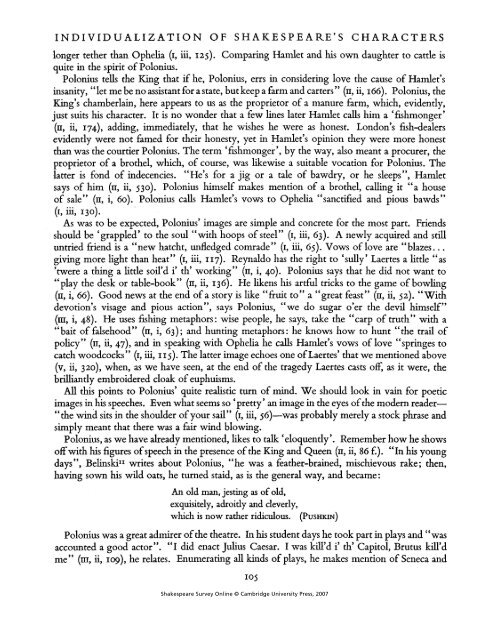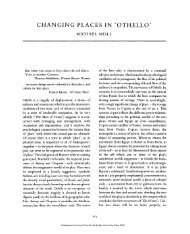the individualization of shakespeare's characters through imagery
the individualization of shakespeare's characters through imagery
the individualization of shakespeare's characters through imagery
You also want an ePaper? Increase the reach of your titles
YUMPU automatically turns print PDFs into web optimized ePapers that Google loves.
INDIVIDUALIZATION OF SHAKESPEARE'S CHARACTERS<br />
longer te<strong>the</strong>r than Ophelia (i, iii, 125). Comparing Hamlet and his own daughter to cattle is<br />
quite in <strong>the</strong> spirit <strong>of</strong> Polonius.<br />
Polonius tells <strong>the</strong> King that if he, Polonius, errs in considering love <strong>the</strong> cause <strong>of</strong> Hamlet's<br />
insanity, "let me be no assistant for a state, but keep a farm and carters" (n,ii, 166). Polonius, <strong>the</strong><br />
ICing's chamberlain, here appears to us as <strong>the</strong> proprietor <strong>of</strong> a manure farm, which, evidently,<br />
just suits his character. It is no wonder that a few lines later Hamlet calls him a 'fishmonger'<br />
(n, ii, 174), adding, immediately, that he wishes he were as honest. London's fish-dealers<br />
evidently were not famed for <strong>the</strong>ir honesty, yet in Hamlet's opinion <strong>the</strong>y were more honest<br />
than was <strong>the</strong> courtier Polonius. The term 'fishmonger', by <strong>the</strong> way, also meant a procurer, <strong>the</strong><br />
proprietor <strong>of</strong> a bro<strong>the</strong>l, which, <strong>of</strong> course, was likewise a suitable vocation for Polonius. The<br />
latter is fond <strong>of</strong> indecencies. "He's for a jig or a tale <strong>of</strong> bawdry, or he sleeps", Hamlet<br />
says <strong>of</strong> him (n, ii, 530). Polonius himself makes mention <strong>of</strong> a bro<strong>the</strong>l, calling it "a house<br />
<strong>of</strong> sale" (n, i, 60). Polonius calls Hamlet's vows to Ophelia "sanctified and pious bawds"<br />
(1, iii, 130).<br />
As was to be expected, Polonius' images are simple and concrete for <strong>the</strong> most part. Friends<br />
should be 'grappled' to <strong>the</strong> soul "with hoops <strong>of</strong> steel" (1, iii, 63). A newly acquired and still<br />
untried friend is a "new hatcht, unfledged comrade" (1, iii, 65). Vows <strong>of</strong> love are "blazes...<br />
giving more light than heat" (1, iii, 117). Reynaldo has <strong>the</strong> right to 'sully' Laertes a little "as<br />
'twere a thing a little soil'd i' th' working" (n, i, 40). Polonius says that he did not want to<br />
"play <strong>the</strong> desk or table-book" (n, ii, 136). He likens his artful tricks to <strong>the</strong> game <strong>of</strong> bowling<br />
(n, i, 66). Good news at <strong>the</strong> end <strong>of</strong> a story is like "fruit to" a "great feast" (n, ii, 52). "With<br />
devotion's visage and pious action", says Polonius, "we do sugar o'er <strong>the</strong> devil himself"<br />
(m, i, 48). He uses fishing metaphors: wise people, he says, take <strong>the</strong> "carp <strong>of</strong> truth" with a<br />
"bait <strong>of</strong> falsehood" (n, i, 63); and hunting metaphors: he knows how to hunt "<strong>the</strong> trail <strong>of</strong><br />
policy" (n, ii, 47), and in speaking with Ophelia he calls Hamlet's vows <strong>of</strong> love "springes to<br />
catch woodcocks" (1, iii, 115). The latter image echoes one <strong>of</strong> Laertes' that we mentioned above<br />
(v, ii, 320), when, as we have seen, at <strong>the</strong> end <strong>of</strong> <strong>the</strong> tragedy Laertes casts <strong>of</strong>f, as it were, <strong>the</strong><br />
brilliantly embroidered cloak <strong>of</strong> euphuisms.<br />
All this points to Polonius' quite realistic turn <strong>of</strong> mind. We should look in vain for poetic<br />
images in his speeches. Even what seems so 'pretty' an image in <strong>the</strong> eyes <strong>of</strong> <strong>the</strong> modern reader—<br />
"<strong>the</strong> wind sits in <strong>the</strong> shoulder <strong>of</strong> your sail" (1, iii, 56)—was probably merely a stock phrase and<br />
simply meant that <strong>the</strong>re was a fair wind blowing.<br />
Polonius, as we have already mentioned, likes to talk 'eloquently'. Remember how he shows<br />
<strong>of</strong>f with his figures <strong>of</strong> speech in <strong>the</strong> presence <strong>of</strong> <strong>the</strong> King and Queen (n, ii, 86 £). "In his young<br />
days", Belinski 11 writes about Polonius, "he was a fea<strong>the</strong>r-brained, mischievous rake; <strong>the</strong>n,<br />
having sown his wild oats, he turned staid, as is <strong>the</strong> general way, and became:<br />
An old man, jesting as <strong>of</strong> old,<br />
exquisitely, adroitly and cleverly,<br />
which is now ra<strong>the</strong>r ridiculous. (PUSHKIN)<br />
Polonius was a great admirer <strong>of</strong> <strong>the</strong> <strong>the</strong>atre. In his student days he took part in plays and "was<br />
accounted a good actor". "I did enact Julius Caesar. I was kill'd i' th' Capitol, Brutus kill'd<br />
me" (m, ii, 109), he relates. Enumerating all kinds <strong>of</strong> plays, he makes mention <strong>of</strong> Seneca and<br />
105<br />
Shakespeare Survey Online © Cambridge University Press, 2007



